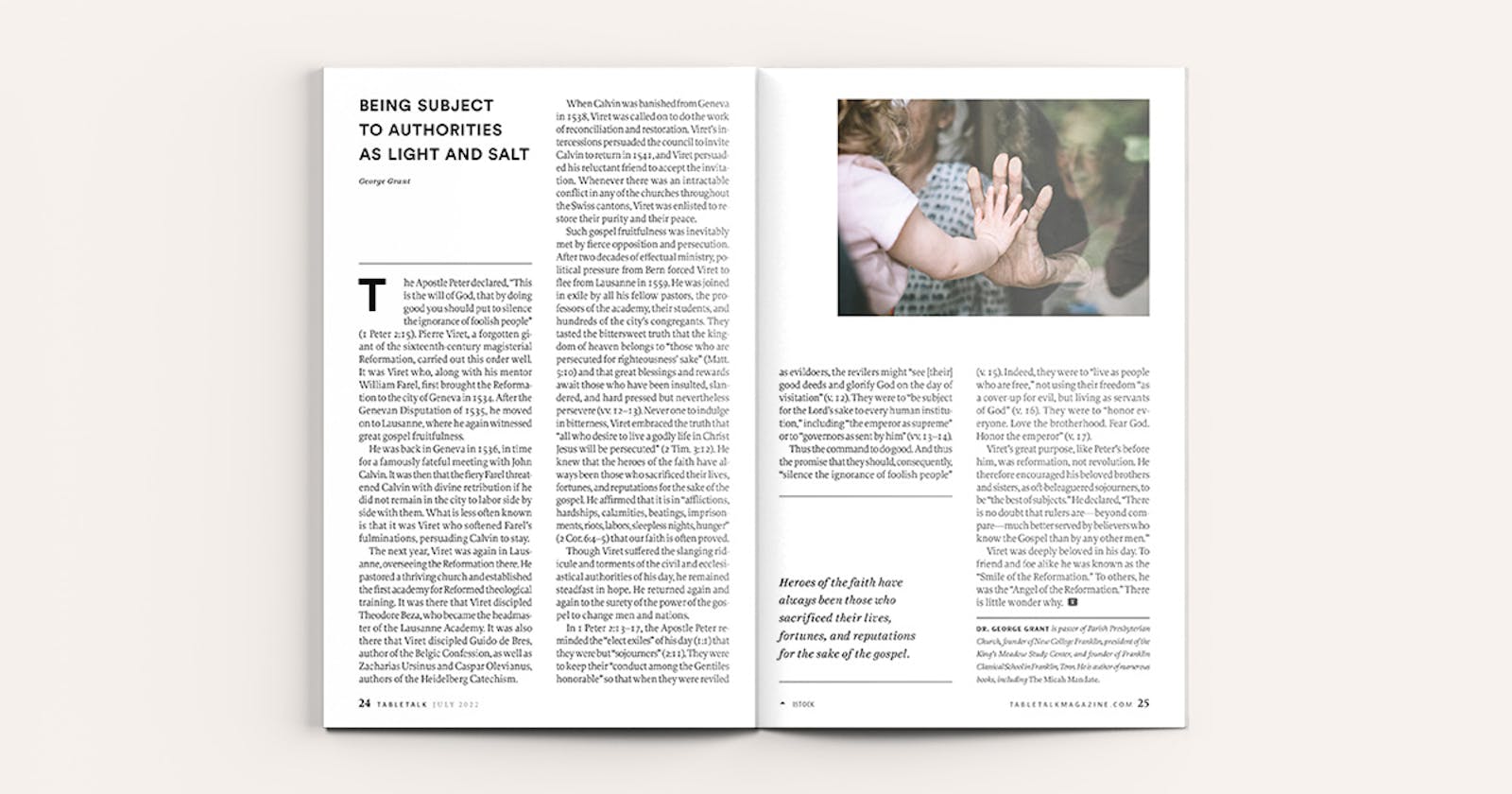
Request your free, three-month trial to Tabletalk magazine. You’ll receive the print issue monthly and gain immediate digital access to decades of archives. This trial is risk-free. No credit card required.
Try Tabletalk NowAlready receive Tabletalk magazine every month?
Verify your email address to gain unlimited access.
The Apostle Peter declared, “This is the will of God, that by doing good you should put to silence the ignorance of foolish people” (1 Peter 2:15). Pierre Viret, a forgotten giant of the sixteenth-century magisterial Reformation, carried out this order well. It was Viret who, along with his mentor William Farel, first brought the Reformation to the city of Geneva in 1534. After the Genevan Disputation of 1535, he moved on to Lausanne, where he again witnessed great gospel fruitfulness.
He was back in Geneva in 1536, in time for a famously fateful meeting with John Calvin. It was then that the fiery Farel threatened Calvin with divine retribution if he did not remain in the city to labor side by side with them. What is less often known is that it was Viret who softened Farel’s fulminations, persuading Calvin to stay.
The next year, Viret was again in Lausanne, overseeing the Reformation there. He pastored a thriving church and established the first academy for Reformed theological training. It was there that Viret discipled Theodore Beza, who became the headmaster of the Lausanne Academy. It was also there that Viret discipled Guido de Bres, author of the Belgic Confession, as well as Zacharias Ursinus and Caspar Olevianus, authors of the Heidelberg Catechism.

When Calvin was banished from Geneva in 1538, Viret was called on to do the work of reconciliation and restoration. Viret’s intercessions persuaded the council to invite Calvin to return in 1541, and Viret persuaded his reluctant friend to accept the invitation. Whenever there was an intractable conflict in any of the churches throughout the Swiss cantons, Viret was enlisted to restore their purity and their peace.
Such gospel fruitfulness was inevitably met by fierce opposition and persecution. After two decades of effectual ministry, political pressure from Bern forced Viret to flee from Lausanne in 1559. He was joined in exile by all his fellow pastors, the professors of the academy, their students, and hundreds of the city’s congregants. They tasted the bittersweet truth that the kingdom of heaven belongs to “those who are persecuted for righteousness’ sake” (Matt. 5:10) and that great blessings and rewards await those who have been insulted, slandered, and hard pressed but nevertheless persevere (Matt. 5:12–13). Never one to indulge in bitterness, Viret embraced the truth that “all who desire to live a godly life in Christ Jesus will be persecuted” (2 Tim. 3:12). He knew that the heroes of the faith have always been those who sacrificed their lives, fortunes, and reputations for the sake of the gospel. He affirmed that it is in “afflictions, hardships, calamities, beatings, imprisonments, riots, labors, sleepless nights, hunger” (2 Cor. 6:4–5) that our faith is often proved.
Though Viret suffered the slanging ridicule and torments of the civil and ecclesiastical authorities of his day, he remained steadfast in hope. He returned again and again to the surety of the power of the gospel to change men and nations.
In 1 Peter 2:13–17, the Apostle Peter reminded the “elect exiles” of his day (1 Peter 1:1) that they were but “sojourners” (1 Peter 2:11). They were to keep their “conduct among the Gentiles honorable” so that when they were reviled as evildoers, the revilers might “see [their] good deeds and glorify God on the day of visitation” (1 Peter 2:12). They were to “be subject for the Lord’s sake to every human institution,” including “the emperor as supreme” or to “governors as sent by him” (1 Peter 2:13–14).
Thus the command to do good. And thus the promise that they should, consequently, “silence the ignorance of foolish people” (1 Peter 2:15). Indeed, they were to “live as people who are free,” not using their freedom “as a cover-up for evil, but living as servants of God” (1 Peter 2:16). They were to “honor everyone. Love the brotherhood. Fear God. Honor the emperor” (1 Peter 2:17).
Viret’s great purpose, like Peter’s before him, was reformation, not revolution. He therefore encouraged his beloved brothers and sisters, as oft-beleaguered sojourners, to be “the best of subjects.” He declared, “There is no doubt that rulers are—beyond compare—much better served by believers who know the Gospel than by any other men.”
Viret was deeply beloved in his day. To friend and foe alike he was known as the “Smile of the Reformation.” To others, he was the “Angel of the Reformation.” There is little wonder why.
Heroes of the faith have always been those who sacrificed their lives, fortunes, and reputations for the sake of the gospel.
